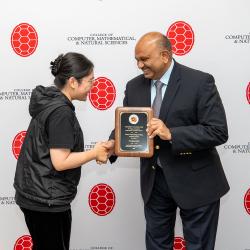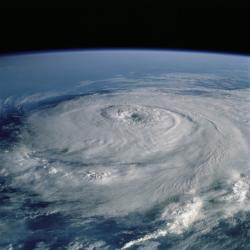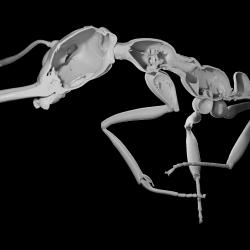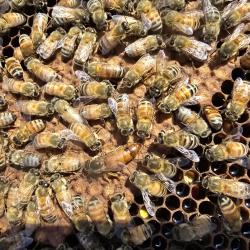CMNS Summer Reads for 2024
Eight faculty and staff members share their favorite books—both old and new.
If you find yourself with some free time this summer and want to explore fascinating areas of science—look no further. The CMNS Summer Reads list has you covered.
Check out our 2024 summer reading list for Science Terps, with books recommended by faculty and staff members from the University of Maryland’s College of Computer, Mathematical, and Natural Sciences.
Outlive: The Science & Art of Longevity

By Peter Attia
“Living life is like an experiment in itself. This book teaches you about the pillars for not only living longer but also living better,” said Geology Professor Sujay Kaushal. “I’m recommending this book because everyone has the potential to improve their physical and mental health at any time. Summer is the perfect time to get outside, move around and prioritize well-being.”
"Outlive" taught Kaushal—who happens to be partial to cookies and pasta—that managing his carbohydrate intake or taking a walk after eating can help regulate his blood sugar, which is important because he has a genetic predisposition for diabetes. Kaushal says his dog Goldy also helps get him moving in the mornings.
“From a mental health perspective, I try not to let things bother me as much," Kaushal said. "There are lots of stressors every day, but I ask myself, ‘Sujay, is this really worth getting annoyed about and impacting my health?’ It becomes kind of like a challenge for me to see how patient I can be and then get satisfaction from that small accomplishment in handling a stressful situation.”
Of Time and Turtles: Mending the World, Shell by Shattered Shell

By Sy Montgomery
"Of Time and Turtles" caught CMNS Associate Dean for Undergraduate Education Bob Infantino’s eye when it hit the New York Times Bestsellers List in October 2023.
“The book explores the worldwide decline of turtles for all sorts of reasons, epicurean to roadkill,” Infantino said. “While there is exploration of turtle biology, natural history and biodiversity, this is also a story of the natural history of the humans who care for them—including wealthy New Englanders who keep an eye out for large snapping turtles, children developing into citizen-scientists by exploring the risky lives of turtles, and the rotary club.”
Montgomery tells the in-depth story of how turtle conservationists, aka the Turtle Rescue League, have devoted their lives to saving turtles.
“As the author's exploration deepens, the onset of the COVID pandemic essentially embeds her for long stints in a rescue and breeding facility,” Infantino said. “The slowing of time brought on by the pandemic allows for a deep exploration of the life history of turtles. Such a slow and reverent appreciation seems fully appropriate for a group whose members include species whose lifespan may exceed 300 years! Revere the Turtle!”
Alfred Tarski: Life and Logic

By Anita Burdman Feferman
“This book tells the story of a remarkable Polish logician and mathematician Alfred Tarski,” said Mathematics Professor and Brin Chair Artem Chernikov. “Also known as ‘the man who defined truth,’ he fled the Nazi persecution and single-handedly turned the University of California at Berkeley into the world center for the study of logic, with profound influence in philosophy, linguistics and computer science.”
“This biography offers a roller coaster of characters and stories ranging from the artistic and intellectual communities of pre-war Warsaw, the Vienna Circle, the Institute for Advanced Study and the burgeoning UC Berkeley scene of the ’60s—all while explaining some of the fundamental ideas from logic in an engaging manner,” Chernikov said.
The Future We Choose: The Stubborn Optimist’s Guide to the Climate Crisis

By Christiana Figueres and Tom Rivett-Carnac
“Impacts of climate change are already around us—record temperatures, droughts, increased wildfires, more dangerous storms. Scientists aren’t uncertain about what our future holds if we continue to burn fossil fuels and allow other climate-warming emissions,” said Entomology Professor Sara Via. “The big uncertainty now is whether people and their governments will choose to build a better future despite ongoing pressure from vested interests and an overall resistance to change.”
Authored by the architects of the 2015 Paris Climate Accord, the book outlines a way forward for addressing the climate crisis.
“I really like this book because visualizing a great future gives us something positive to hold in our minds as we do the hard work to make it happen,” Via said. “The authors outline key steps to take and discuss how we can move through the inevitable setbacks with a mindset they call ‘stubborn optimism.’ Most importantly, they make it clear that solving the climate crisis requires that we first make our choice.”
The Machinery of Life

By David S. Goodsell
“All life on Earth is possible due to the reactions and interactions of biomolecules. There are millions of these sub-microscopic molecular machines functioning within a single cell,” said Chemistry and Biochemistry Assistant Professor Myles Poulin. “While we often describe the structure and functions of these molecules, it is more difficult to imagine how these millions of molecules are coordinated and interact in the complex environment that is a cell.”
In "The Machinery of Life," Goodsell uses “beautiful illustrations and elegant descriptions” to introduce the reader to the biomolecular machines that make life possible.
"I find myself constantly returning to the illustrations and explanations in this book for inspiration when I think about my own research,” Poulin said. “This book helps to distill down some of the complexity of molecular interactions and reinforces that life is only possible due to the coordinated interactions of millions of biological molecules."
The Sixth Extinction: An Unnatural History

By Elizabeth Kolbert
“Geologists tell us that there have been five mass extinctions when life and the number of species on Earth suddenly fell catastrophically,” said Atmospheric and Oceanic Science Professor Russ Dickerson. “In 'The Sixth Extinction,' the author shows that previous mass extinctions were caused by catastrophic external events. Human-caused extinctions are now (and have been for tens of thousands of years) proceeding at a rapid rate that on geological time scales looks as fast as the loss of the dinosaurs seen at the KT boundary.”
“The author does a good job explaining technical issues to the general reader—a skill all scientists should seek,” Dickerson said. “The book blends several fields linked to species extinction, such as ecology, population biology, marine fisheries and climate change geology, to show the precarious position of the living Earth. She ends on a reasonable, optimistic note with illustrations of actions being taken to conserve or preserve species and ecosystems.”
Specimen J8N3S

By Meredith A. M. Jewell
“'Specimen J8N3S' is set in a Maryland facility that conducts genetic engineering research, and the first character we meet (Lily) is on the verge of a major scientific breakthrough,” said Eden Hurley, undergraduate admissions counseling and recruitment program manager for CMNS. “This is such a wonderful self-published (debut) book written by a former College Park resident and Walter Johnson High School math teacher.”
“With great character development, constant forward movement and one reveal after another, I loved being able to see things from the point of view of each of the major players in the story while also understanding each player’s motivations,” Hurley said. “I'd call it a mystery/sci-fi/thriller all in one, with undertones of dark humor. I can easily see this being turned into a movie or a mini-series, and I cannot wait to read whatever the author writes next!”
Free Radicals: The Secret Anarchy of Science

By Michael Brooks
“'Free Radicals' is a tour-de-force of how the personalities of scientists (the good, the bad and the ugly) have been intertwined with many notable scientific findings,” said Ross Salawitch, a professor in UMD's Earth System Science Interdisciplinary Center, as well as the Departments of Atmospheric and Oceanic Science and Chemistry and Biochemistry.
“This easy-to-read book tears down the myth of the logical scientist who follows a clearly defined scientific method,” Salawitch said. “It documents—through extensively researched storytelling—the sordid behavior of numerous eminent scientists who have long been treated as minor deities in the popular press, also highlighting the triumphs of many who have overcome poor treatment by others (including luminaries such as Rosalind Franklin, Carl Sagan and Alfred Wegener).”
“I highly recommend this book for all scientists—especially those at the start of their careers, because I cannot stress enough from my own experience that success in science needs more courage than we might think,” Salawitch added.
Looking for more book recommendations from Science Terps? See our summer reading lists from 2023 and 2022.







